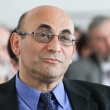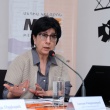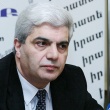Russia and the Karabakh conflict – 2018
On September 4-5 an online conference, entitled Russia and the Karabakh Conlifct – 2018 was held on the Public Dialogues website (www.publicdialogues.info). The conference was organized within the framework of the “Public Dialogues for Communication between Armenian and Azerbaijani Specialists” project, implemented by Region Research Center.
The project is supported by the Black Sea Trust for Regional Cooperation, German Marshall Fund.
The project partner is the Institute for Peace and Democracy (the Netherlands). The "Public Dialogues" website was created in 2012 by the Region Research Center and the
Institute for Peace and Democracy which operated in Azerbaijan at the time.
Who participated in the discussion?
Alexander Podrabinek (Russia) - journalist, human rights activist.
Vadim Mukhanov (Russia) – PhD in History Studies, leading researcher at the Center for Post-Soviet Studies, IMEMO, RAS,
Stepan Grigoryan (Armenia) – Director of the Analytical Center on Globalization and Regional Cooperation,
Emin Akhmedbekov (France ) - political commentator, Turan TV,
Laura Baghdasaryan (Armenia), the director of Region Research Center, acted as the moderator of the conference.
What issues and aspects were discussed?
- The main priorities of Russia in relations with Armenia and Azerbaijan at the moment,
- The impact of these priorities on the Karabakh conflict in the foreseeable future,
- The interest in external conflicts held by authoritarian regimes to strengthen their power,
- The role of democracies in conflict resolution,
- Russia's reaction to internal processes in Armenia and the fight against corruption, the filed criminal charges against certain figures,
- The results of Aliyev's working visit to Russia on September 1, and the forthcoming meeting between N. Pashinyan and V. Putin on September 8,
- Wars of memory and the issue of changing elites and generations,
- The perception of Russia's policy over the Karabakh conflict in Russia, and the dynamics of Russia's perception in Armenia and Azerbaijan within the same Karabakh context,
- The capacities of the parties to the conflict, mediators for the outcome of the conflict (military or political),
- CSTO in the context of the Karabakh conflict and an evaluation of the campaign launched in the Azerbaijani media about the potential integration of Azerbaijan into this organization.
Russia and the Karabakh Conflict - 2018
Excerpts from the Materials of the Online Conference (September 4-5, 2018)
(For the full text of the materials, see here: http://www.publicdialogues.info/node/810)
Laura Baghdasaryan – The mediation mission of Russia has been there for as long as the Karabakh conflict itself. As at the very beginning of the Armenian-Azerbaijani confrontation (in 1988), today too - more than 30 years later, the parties to the conflict have closer connections with Russia, than the other two OSCE MG co-chairing countries. Today we can state that the historically objective connections Russia (Soviet Russia at the time) had with the conflict have got fragmented over years. This connection and Russia's interest in the Karabakh conflict are shaped by economic and geopolitical interests, and even internal political issues in Armenia and Azerbaijan. On the other hand, Russia acts as one of the countries co-chairing the OSCE Minsk Group, formally demonstrating "equidistance" from the parties to the conflict.
It is interesting that the relations with Armenia and Azerbaijan in Russia, and reversely, the perception of Russia as a partner country in Armenia and Azerbaijan were viewed in different coordinates and dimensions in different years. If the main criterion for Russia was the foreign policy vector in the development of Armenia and Azerbaijan (and keeping the countries within its influence orbit), for Armenia and Azerbaijan the degree of Russia's loyalty to the Armenian and, respectively, Azerbaijani positions in the struggle for Karabakh remained unchanged. However, unlike Azerbaijan, this formula was not always of absolute priority in the relations of Armenia with other countries. Take for example the case with the Armenian-Turkish protocols. Or Armenia’s policy in relation to other countries that show unconcealed sympathy for Azerbaijan.
Stepan Grigoryan – I think that Russia's top priority in the post-Soviet space is to prevent the integration of post-Soviet countries into other political, military-strategic and economic systems. Therefore, in the context of Armenia and Azerbaijan, Russia would not want their rapprochement, for example, with the EU. The unresolved nature of the Karabakh conflict is a good tool for achieving this goal. There is another aspect in Russia's policy in the South Caucasus. As you know, Russia sells weapons to Armenia and Azerbaijan. On the other hand, Russia is the key co-chair of the OSCE Minsk Group, and logic suggests that it should not have participated in the militarization of the region. I am not yet referring to the fact that Armenia together with Russia are members of the CSTO, a system of collective security. It might seem that this factor should have played a deterrent role in the sale of weapons to Azerbaijan. However, we see a rather complex policy pursued by Russia in the region, and it is clearly difficult to qualify it.
Vadim Mukhanov – It is obvious that Moscow is interested in a stable and predictable development of the situation throughout the Caucasus region, but a number of internal and external factors have an impact on this. The situation in the region and beyond is changing rapidly, which affects priorities and the sequence thereof. Unquestionably, Moscow's relations with Yerevan and Baku have and will have a direct impact on the situation in the conflict zone. However, the main actors in the settlement are the parties to the conflict, and a key marker in the evaluation is the evident interest of the parties in any compromise. The reference to Moscow is traditional and understandable, but it no longer plays such a role as, for example, it did in the 90s.
Alexander Podrabinek - The key to the solution of the Karabakh issue is, first of all, in the democratization of Armenia and Azerbaijan, as well as in getting rid of dependence on Russia. The decades-long attempts to resolve the problem through negotiations are completely fruitless and hopeless. This is similar to treating a serious illness with spells. Today, there is a hope that Armenia will show an example of effective development and possible solution of the Karabakh issue. That is why we should expect the Kremlin to try to stop Pashinyan. I think Moscow is looking for ways to do this. The Putin administration is unlikely to accept the possibility of stabilization in the Caucasus and the beginning of the peace process over Karabakh.
Vadim Mukhanov - I will try to respond laconically to the latest theses put forth by Alexander (Podrabinek - ed.), which I disagree with. The Russian influence and presence in the Caucasus has been declining in the recent years, and this is taking place against the backdrop of a change of generations. I believe that linking the change in the political landscape with the Karabakh settlement, as well as making the torpedoing of the Karabakh settlement as a priority for Moscow seems to be a very naive approach, given that both Baku and Yerevan are guarding the Karabakh settlement from any encroachment ...
Alexander Podrabinek - Dear Vadim, what makes you assume that "the Russian influence and presence in the Caucasus has been declining in the recent years"? Look, for example, at the part of Georgia occupied by Russia. And what about the supply of weapons to Azerbaijan? The connection between the political landscape and the Karabakh settlement is quite direct, for any international settlement depends on the political will of the parties to the conflict. What is there to argue about?
Vadim Mukhanov - As for the arms deliveries to Azerbaijan, one can only ask a counter question here. Don’t democratic countries, in your terms, genuinely democratic countries not supply weapons to Azerbaijan? Or here, too, there is some criterion unknown to us regarding who can trade profitably with Baku, and who cannot?
Emin Ahmedbekov - Dear Vadim! Weapons are supplied to Azerbaijan only by those countries where there is no democracy, and I want to note that this is primarily due to kickbacks from each transaction.
Vadim Mukhanov- Emin (Akhmedbekov - ed.), I am not ready to become an arbiter in assessing the democratic character of this or that regime, but kickbacks exist and have existed regardless of the level of democracy, rather they demonstrated parallel existence ... Weapons are sold to Azerbaijan by a number of countries, including those in Europe, the Middle East, etc. It would be naive to speak of Russia's withdrawal from the arms market, when it already reduces its presence there every year.
Laura Baghdasaryan - I do not remember Russia reacting in any way to I. Aliyev’s steps of establishing his own and his family’s indefinite rule over the country for many decades and the harsh pressure of any dissent in Azerbaijan. Whereas the criminal charges initiated against the ex-president of the Republic of Armenia R. Kocharyan, who, by the way, firmly positions himself as a supporter of the resolution of the conflict without compromises, have caused Moscow's anxious reaction. Our participants have already spoken about this a bit earlier. But I have one more question in connection with these circumstances. Is Kocharyan as a figure a well-launched plot to put pressure on Armenia just in case, as a preventive measure? After all, it is well known that currently Armenia has two problems in its relations with Russia. This is the issue of sovereignty in decision-making and the Karabakh conflict.
Emin Ahmedbekov - Everything that has happened in Armenia in the recent months, has caused a lot of anxiety among the rulers of Azerbaijan. Against this background, stronger pressure has started to be put on the civil society in Azerbaijan, and Moscow largely supports this.
Stepan Grigoryan - Indeed, in Russia they are quite wary of the changes in our countries. Moscow has a fear that democratic changes in our countries can alienate us from Russia. But I very often cite the example of Finland. This country of classical democracy used to be a part of Tsarist Russia. So what? Doesn’t Russia cooperate with this country? I can assure you that there is a multilateral and deep cooperation. Even now, when the EU is applying serious sanctions against Russia! That is to say, in Russia, over time, they should understand the inevitability of strengthening sovereignty in our countries and should not be afraid of it. Whereas the making of a mutually beneficial cooperation will eliminate the danger for Russia to lose our countries. Russia's tougher policy towards our countries can lead to the opposite effect.
Laura Baghdasaryan: Russia’s behavior in the case of Karabakh is definitely stands out as exclusively different from Russia's position in the other conflict zones of the post-Soviet space. In April 2016 Russia reacted extremely reservedly to the unfolding of the four-day war by Azerbaijan, whereas in August 2008 it not only severely repulsed the offensive of the Georgian troops, but also recognized the independence of South Ossetia and Abkhazia. In the Ukrainian case Russia is in favor of a direct dialogue between Kiev and Donbas, but Pashinyan's statement about the need for talks not with Armenia, but with the NKR, was treated with callous indifference, we can say was not reacted to at all. And I think, not only because Russia is the mediator of the OSCE Minsk Group, but also because the priorities in the relations with Armenia and Azerbaijan do not dovetail in any way, except in one thing - how to bind these countries to Russia as tighter as possible: Armenia – from the point of view of security guarantees, and Azerbaijan - from the point of view of the strengthened energetic component.
Stepan Grigoryan - Regarding R. Kocharyan’s (ex-president of Armenia, 1998-2008 - Ed.) factor. Of course, he did not plan to enter politics. However, when the new Armenian authorities started investigating the events of March 1, 2008 seriously (then ten people were killed during the protest rallies of the opposition, and hundreds of politicians were imprisoned afterwards), it turned out that R. Kocharyan's guilt was serious and he was arrested last August. Of course, R. Kocharyan understood that the best way to avoid punishment for shooting at the participants of peaceful rallies was to engage in politics. Well, the Russian government "took advantage of this", because in the Kremlin they are not accustomed to the Armenian leaders acting on an equal footing (which Nikol Pashinyan is trying to do). That is to say, the obvious support to R. Kocharyan by the Kremlin is understandable: it is a good way to limit Pashinyan's legitimacy and independence. I am sure that over Moscow will realize that a change of elite is inevitable in Armenia and that they must get used to working with young leaders oriented toward national interests and ready to cooperate with Russia equitably.
Vadim Mukhanov - The Karabakh conflict unlike all the others in the Caucasus is the only platform where the unity of the interests of the three co-chairing countries is manifested or can be felt. However, in the recent years the Minsk Group has rarely taken the initiative for creating or proposing a new agenda, organizing new meetings and putting forth proposals, that is to say we can rather observe the response of the Minsk Group to certain events, especially, escalations. This is not enough, and it is already becoming obvious. It should be about taking the initiative and putting pressure on the parties who do not want to do anything on their own. The situation resembles a situation with schoolchildren where two quarreled boys are seated at different ends of the class, and until the teacher or mentor takes them by the hands and leads them to each other, they will not take a single step to meet each other halfway.
Stepan Grigoryan - As to the perception of Russia in Azerbaijan within the context of the Karabakh conflict, it seems to me that the dominant point there is that the resolution of the conflict depends on Russia. And if Russia "presses" on Armenia, it will make concessions. Of course, Russia could put pressure on Serzh Sargsyan, but there is also an Armenian society, people living in Karabakh, and I do not think that everything was that easy. But there is such a stereotype in Azerbaijan, both in the government and the society as a whole.
Emin Ahmedbekov - In Azerbaijan they also faced social indifference even to the Karabakh issue. Thanks to the dictatorship, today’s society cannot influence any processes in the country. The people are intimidated by imprisonment and repressions. This is the propaganda of the authorities in the country. But part of the society understands and realizes that we – the two peoples – will resolve the conflict by ourselves.
ON THE POTENTIAL OUTCOME OF THE KARABAKH CONFLICT
On the capacity of the parties to the conflict
Emin Ahmedbekov - (with the perception of the outcomes as a result of the military solution) - The conflict is frozen, and in this form, it is beneficial to everyone, both the Azerbaijani and Armenian leadership. The leadership of Azerbaijan has an obligation before its partners in the sales transactions of energy resources. A lot of money is at stake.
Stepan Grigoryan – Negotiations over Karabakh were interrupted in the past five years. Now no one remembers the Madrid principles. And taking into account the fact that Ilham Aliyev makes tough statements about both Karabakh and Armenia (it turns out that Yerevan too is already Azerbaijani), it's hard to imagine what Serzh Sargsyan could offer. Moreover, since he also played the trump of Karabakh to preserve power. While Nikol Pashinyan does not have time to concentrate on it.
Vadim Mukhanov - Today, both sides have limited capacity for coming to an outcome of the conflict.
Alexander Podrabinek - Armenia and Azerbaijan do not have tools for the peaceful resolution of the conflict.
On the capacity of mediators and regional actors
Emin Ahmedbekov - Right now both Russia and Turkey and Iran have their own economic problems, and I do not think that they can have any influence on the conflict.
Vadim Mukhanov - The role of the co-chairing countries is significant, but only their consolidated and constant influence on the parties can yield fruit, which we cannot see today. Iran, and especially Turkey, play a significant role and are actively involved in the palette of the conflict. If we recall the events of 2016, we can see that Ankara’s role and involvement in the conflict was very significant.
Alexander Podrabinek - Russia is interested in maintaining tensions and smoldering military conflicts in the Caucasus under the current authoritarian regime. Therefore, all efforts will be directed at preserving the status quo. It will continue to support both sides, distributing its assistance in accordance with its own interests.
On the possible entry of Azerbaijan into the CSTO and the role of this organization
Emin Ahmedbekov – The CSTO is a fictitious organization, like GUAM, and many others. Azerbaijan will never join this organization. All the threats are devised against the background of Russia's instructions to pacify Pashinyan's ardor and prevent the emergence of a new Saakashvili in the Caucasus.
Stepan Grigoryan - Of course the CSTO is an inefficient organization. Azerbaijan's entry into the CSTO is unrealistic. I think this ado was raised by Russia so that Nikol Pashinyan became more compliant and refrained from raising difficult questions in the CSTO and the Eurasian Economic Union.
Vadim Mukhanov – Should we have a strong desire, the CSTO can be considered a deterrent lever, but only of the second or third rank. The degree of influence of this organization on the situation and its development in the region is insignificant. I agree with my colleagues that it is not necessary to expect Azerbaijan's joining the CSTO in the near future.
Alexander Podrabinek - Azerbaijan's integration into the CSTO is possible if there is a real threat to the preservation of Aliyev's power. This may be an external or internal threat, in this case the dictator will be determined to undertake on any measure that can keep him in power.
Please read the full material of the internet conference in Russian here:








